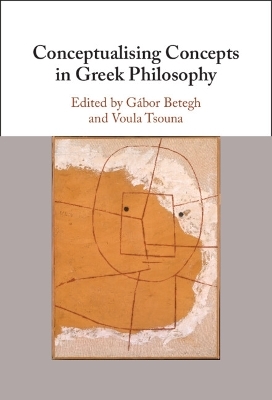
Conceptualising Concepts in Greek Philosophy
Cambridge University Press (Verlag)
9781009369572 (ISBN)
Concepts are basic features of rationality. Debates surrounding them have been central to the study of philosophy in the medieval and modern periods, as well as in the analytical and Continental traditions. This book studies ancient Greek approaches to the various notions of concept, exploring the early history of conceptual theory and its associated philosophical debates from the end of the archaic age to the end of antiquity. When and how did the notion of concept emerge and evolve, what questions were raised by ancient philosophers in the Greco-Roman tradition about concepts, and what were the theoretical presuppositions that made the emergence of a notion of concept possible? The volume furthers our own contemporary understanding of the nature of concepts, concept formation, and concept use. This title is part of the Flip it Open Programme and may also be available Open Access. Check our website Cambridge Core for details.
GÁBOR BETEGH is the Laurence Professor of Ancient Philosophy at the University of Cambridge, and a Fellow of Christ's College. He is the author of The Derveni Papyrus: Cosmology, Theology and Interpretation (Cambridge, 2004) and co-editor of Cicero's De Finibus: Philosophical Approaches (with J. Annas) (Cambridge, 2015). VOULA TSOUNA is Distinguished Professor of Philosophy at the University of California, Santa Barbara, President of the Society for Ancient Greek Philosophy, and member of the Scientific Committee of the Fondation Hardt. She is the author of The Epistemology of the Cyrenaic School (Cambridge, 1995), The Ethics of Philodemus (1995), and Plato's Charmides: An Interpretative Commentary (Cambridge, 2022), and co-author of [Philodemus] [On Choices and Avoidances] (1995), which received the Theodor Mommsen Award.
Introduction Gábor Betegh and Voula Tsouna; 1. The Emergence of the Concept in Greek Philosophy André Laks; 2. The Place of Concepts in Socratic Inquiry Terence Irwin; 3. Early Learning in Plato, Republic 7 James Warren; 4. Are Platonic Forms Concepts? David Sedley; 5. Do Forms Play the Role of Concepts in Late Plato? Lesley Brown; 6. Concepts and Concept Formation in Aristotle's Logical Works Richard McKirahan; 7. Concepts and Universals in Aristotle's Metaphysical Thought Christof Rapp; 8. Aristotle on the Stages of Cognitive Development Thomas Kjeller Johansen; 9. Epicureans on Preconceptions and Other Concepts Gábor Betegh and Voula Tsouna; 10. The Stoics on Conceptions and Concepts Katerina Ierodiakonou; 11. Relative Concepts Matthew Duncombe; 12. Concepts in Greek Mathematics Reviel Netz; 13. Doing Things with Concepts in Sextus Empiricus Richard Bett; 14. Platonist Notions and Forms Mauro Bonazzi; 15. Contested Concepts: Plutach's On Common Conceptions Thomas Bénatouïl; 16. Alexander of Aphrodisias on Concepts Frans A. J. de Haas; 17. Plotinus on Concepts Sara Magrin; 18. Concepts in the Neoplatonist Tradition Peter Lautner; 19. Early Christian Philosophers on Concepts George Karamanolis.
| Erscheinungsdatum | 02.03.2024 |
|---|---|
| Zusatzinfo | Worked examples or Exercises |
| Verlagsort | Cambridge |
| Sprache | englisch |
| Maße | 160 x 236 mm |
| Gewicht | 876 g |
| Themenwelt | Geisteswissenschaften ► Philosophie ► Philosophie Altertum / Antike |
| ISBN-13 | 9781009369572 / 9781009369572 |
| Zustand | Neuware |
| Informationen gemäß Produktsicherheitsverordnung (GPSR) | |
| Haben Sie eine Frage zum Produkt? |
aus dem Bereich


